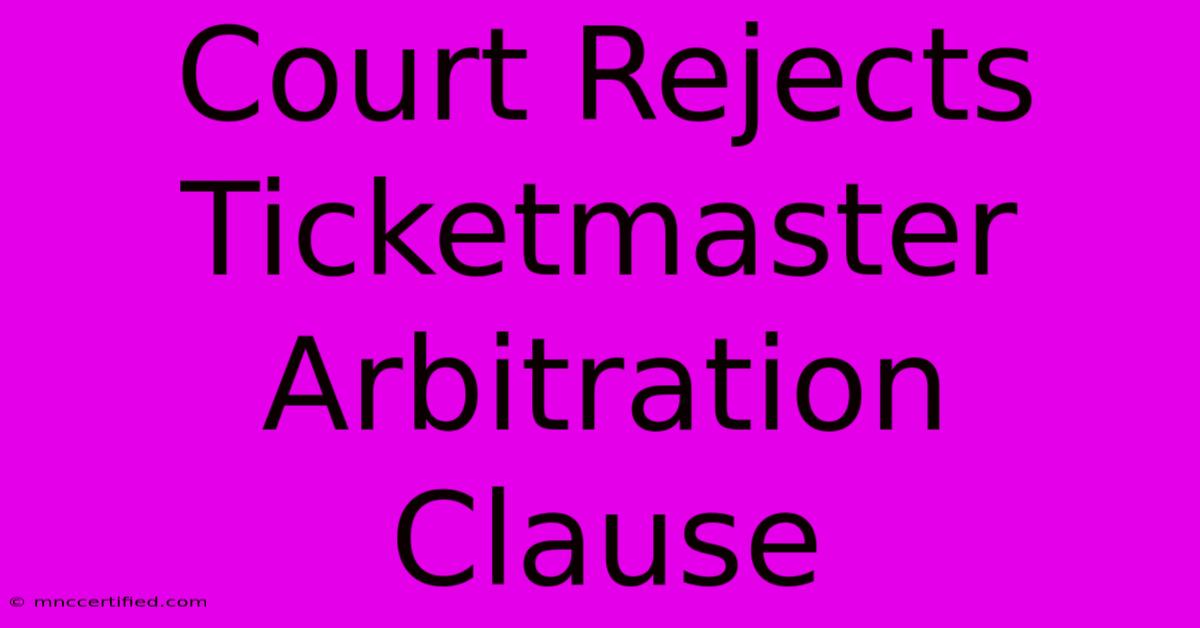Court Rejects Ticketmaster Arbitration Clause

Table of Contents
Court Rejects Ticketmaster Arbitration Clause: A Victory for Consumers?
Ticketmaster, the behemoth of the ticketing industry, recently faced a significant legal setback. A court ruling has rejected Ticketmaster's attempts to enforce its arbitration clause, a decision that could have widespread implications for consumers and the future of online ticketing. This article delves into the details of this landmark case, exploring its significance and potential consequences.
The Arbitration Clause: A Common Practice, a Contentious Issue
Many companies, including Ticketmaster, utilize arbitration clauses in their terms of service. These clauses typically require customers to resolve disputes through private arbitration rather than pursuing litigation in court. While companies often argue this method is more efficient and cost-effective, critics contend it favors businesses and limits consumer rights. Ticketmaster's arbitration clause, in particular, had been a source of considerable contention.
Why Arbitration Clauses are Controversial
Arbitration clauses often lack transparency, are buried within lengthy terms and conditions, and are frequently presented as a non-negotiable condition of service. This lack of transparency makes it difficult for consumers to understand their rights and potential recourse should a dispute arise. Furthermore, arbitration proceedings are often less accessible and more expensive than court proceedings, disadvantaging consumers who may lack the resources to pursue their claims effectively. The perceived bias towards businesses in arbitration further fuels the controversy.
The Court's Decision: A Turning Point?
The recent court ruling against Ticketmaster represents a potential turning point in the battle against unfair arbitration clauses. The court found that Ticketmaster's arbitration clause was unconscionable, meaning it was so one-sided and unfair as to be unenforceable. This decision highlights the growing judicial scrutiny of these clauses, particularly when applied to powerful corporations dealing with a large volume of consumers.
What Made Ticketmaster's Clause Unconscionable?
The court likely considered several factors in reaching its decision. These could include:
- The lack of transparency: The clause was likely buried within a lengthy and complex agreement.
- The power imbalance: Ticketmaster's dominant position in the market significantly impacts consumers' ability to negotiate terms.
- The potential for biased outcomes: The nature of the arbitration process itself might favor Ticketmaster.
The specific details of the court's reasoning will vary depending on the jurisdiction and the specific wording of the clause, but the overall trend is a growing judicial willingness to scrutinize and invalidate these clauses when deemed unfair.
Implications for Consumers and the Ticketing Industry
This decision could have significant implications for consumers and the ticketing industry as a whole. It may embolden other consumers to challenge similar clauses in their contracts with Ticketmaster and other companies. Furthermore, it could prompt companies to re-evaluate their use of arbitration clauses, moving towards fairer and more transparent dispute resolution mechanisms.
Potential Future Changes in the Ticketing Industry
The ruling might lead to several changes within the ticketing industry:
- Revised arbitration clauses: Companies may revise their clauses to address the issues identified by the court.
- Increased transparency: Companies may be forced to present their terms and conditions more clearly.
- Alternative dispute resolution: Companies may explore alternative dispute resolution methods that are more fair and accessible to consumers.
Conclusion: A Step Towards Consumer Protection
The court's rejection of Ticketmaster's arbitration clause signifies a crucial step towards protecting consumers from unfair contract terms. While this is a significant victory, the battle for fair consumer rights is ongoing. Consumers need to remain vigilant, understand their rights, and advocate for fairer practices within the ticketing industry and beyond. The ruling sets a precedent that could encourage more legal challenges and ultimately lead to greater transparency and fairness in consumer contracts. Further developments in this case and similar lawsuits will continue to shape the legal landscape surrounding arbitration clauses and consumer rights.

Thank you for visiting our website wich cover about Court Rejects Ticketmaster Arbitration Clause. We hope the information provided has been useful to you. Feel free to contact us if you have any questions or need further assistance. See you next time and dont miss to bookmark.
Featured Posts
-
Halleck Creek Project Record High Rare Earths
Nov 27, 2024
-
Watch Barcelona Brest Ucl Match
Nov 27, 2024
-
Planning Rutgers Msg Basketball Game
Nov 27, 2024
-
Aberdeen Loss Inside The Hibs Dressing Room
Nov 27, 2024
-
November 23 Lottery Results Lotto Thunderball
Nov 27, 2024